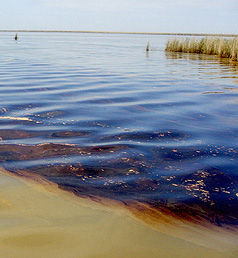Recovery crews are racing to shut down or at least contain oil pouring from the well of a destroyed oil rig in the Gulf of Mexico to prevent it from reaching the fragile Louisiana coastal wetlands.
The US Coast Guard reported Sunday that as many as 1,000 barrels of oil a day – or 42,000 gallons – could be leaking into the water from about 5,000 feet below the surface. The Deepwater Horizon, a oil tanker operated by BP, sank Thursday after an explosion two days earlier.
By comparison, the Exxon Valdez released 11 million gallons into Alaska’s Prince William Sound in 1989.
Robot submarines are being used to try shut off sources of the leak on the sea floor. BP is also launching a special rig Monday that will drill an intervention well to help control the oil flow. But those efforts could take months. Moreover, the company estimates that the sunken platform’s tank may contain as many as 700,000 gallons of oil.
A Coastline Already “Degrading”
Reports suggest that the oil spill is not expected to make landfall in the next three days at least. But the spill’s long-term effect on the coast could be determined by the time needed to cap the leaks. The Louisiana coast is already one of the nation’s most fragile ecosystems, says Alex Kolker, a coastal geologist at both Tulane University and Louisiana University. “Whether those methods work or not is the big variable,” he says.
Mr. Kolker says the coast is especially in danger because it is breeding season for the region’s population of shore birds, waterfowl, and fish. A disruption will be “critical” for maintaining the shoreline’s health.
“A lot of these ecosystems are already degrading because area subsided and has not been replenished with new sediments,” he says.
The spill is located about 40 miles off the Louisiana coast. Various reports suggested that the oil covered a 1,800 square-mile area Monday.
Staging efforts are being made to combat the oil should it continue to make its way to shore. The Coast Guard reports that 1,900 gallons of dispersant to break down the oil were used Friday, and that more 33,000 gallons of mixed oil and water have been captured already.
“Our response plan is focused on quickly securing the source of the subsurface oil emanating from the well, clean the oil on the surface of the water, and keeping the response well offshore,” Rear Adm. Mary Landry, incident commander and federal on-scene coordinator, said in a statement.
The agency said the cause of the explosion remains unknown.
Efforts to locate 11 workers from the tanker were called off Sunday as they were presumed dead. More than 100 workers managed to escape by helicopter soon after the explosion took place.
Second Thoughts on the President’s Plans
Last month President Obama ended a moratorium on oil and gas drilling and exploration from Delaware to central Florida in the Atlantic, as well as opening the eastern Gulf of Mexico. White House spokesman Robert Gibbs told Reuters that despite last week’s oil spill the president “still continues to believe the great majority of that can be done safely, securely and without any harm to the environment.”
However some members of the president’s party are speaking up, saying the explosion may be evidence that the issue needs further review.
Sen. Ben Nelson (D) of Florida said “the tragedy off the coast of Louisiana shows we need to be asking a lot more tough questions of big oil.”
He is asking the Interior Department to produce a report detailing all drilling accidents from the past decade. Echoing his concerns is Sen. Mary Landrieu (D) of Louisiana, who is also asking for an investigation into the spill.
Defying Trump’s right-wing agenda from Day One
Inauguration Day is coming up soon, and at Truthout, we plan to defy Trump’s right-wing agenda from Day One.
Looking to the first year of Trump’s presidency, we know that the most vulnerable among us will be harmed. Militarized policing in U.S. cities and at the borders will intensify. The climate crisis will deteriorate further. The erosion of free speech has already begun, and we anticipate more attacks on journalism.
It will be a terrifying four years to produce social justice-driven journalism. But we’re not falling to despair, because we know there are reasons to believe in our collective power.
The stories we publish at Truthout are part of the antidote to creeping authoritarianism. And this year, we promise we will kick into an even higher gear to give you truthful news that cuts against the disinformation, vitriol, hate and violence. We promise to publish analyses that will serve the needs of the movements we all rely on to survive the next four years, and even build for the future. We promise to be responsive, to recognize you as members of our community with a vital stake and voice in this work.
Please show your support for Truthout with a tax-deductible donation (either once today or on a monthly basis).
